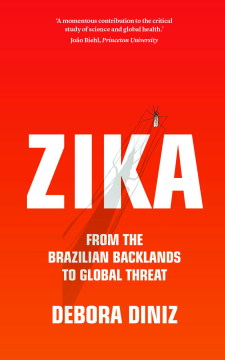
Additional Information
Book Details
Abstract
Winner of the 2017 Jabuti Book Prize
The Zika virus is devastating lives and communities. Children across the Americas are being born with severe disabilities because of it. Yet during the desolating outbreak, Brazil played host to both the Olympics and the FIFA World Cup, leading many to suspect that the true impact of the virus has been subject to a cover-up of international proportions.
Beginning in the northeast, where the devastation has been most felt, professor of bioethics and award-winning documentary filmmaker Debora Diniz travels across Brazil tracing the virus’s origin and spread. Along the journey she meets a host of fearless families, doctors and scientists uncovering the virus’s impact on local communities. In doing so Diniz paints a vivid picture of the Zika epidemic, exposing the Brazilian government’s complicity in allowing the virus to spread while championing the efforts of local doctors and mothers who, working together, are raising awareness of the virus and fighting for the rights of children affected by Zika.
‘A compassionate and inclusive look at the impact of the Zika epidemic: from the mothers of affected babies to the race for an effective treatment.’
Laura Rodrigues, London School of Hygiene & Tropical Medicine
‘Ingeniously crafted and affectingly narrated, Zika is a momentous contribution to the critical study of science and global health.’
João Biehl, Princeton University
‘Diniz illustrates the devastating effects that Zika’s spread has had on impoverished women, and how government scientists and policy makers failed to live up to their responsibilities toward those affected. A brilliant read, highly recommended!’
Udo Schuklenk, Queen’s University, Canada
‘A masterfully researched and wide-ranging narrative of Zika in Brazil. Unforgettable.’
Kearsley Stewart, Duke University
'Captivating … the reader is moved through the interviews on a page-turning, well written, and carefully constructed narrative arch. Nevertheless, the book’s greatest strength is that it is based on scientifically sound and well conducted ethnographic research.'
The Lancet
Debora Diniz is professor of bioethics at the University of Brasilia and an award-winning documentary filmmaker. She is vice-chair of the International Women’s Health Coalition (IWHC) board of directors and a member of the Brazilian Ministry of Health’s National Network of Specialists on Zika and Related Diseases.
Diane Grosklaus Whitty is a translator specialising in the fields of history, health, and the social sciences
Table of Contents
| Section Title | Page | Action | Price |
|---|---|---|---|
| Cover | Cover | ||
| Praise for this book | i | ||
| Title page | iii | ||
| Copyright | iv | ||
| Contents | v | ||
| Acknowledgments | vii | ||
| Translator's Note | viii | ||
| Principal Characters | xi | ||
| The Mothers | xi | ||
| The Doctors | xii | ||
| The Scientists | xiii | ||
| Timeline | xiv | ||
| April 29, 2015 | xiv | ||
| May 14, 2015 | xiv | ||
| September 23, 2015 | xiv | ||
| Map | xx | ||
| Telling the Story | 1 | ||
| Positive for Zika | 14 | ||
| Where It All Began | 14 | ||
| Deciphering an Allergy Epidemic | 20 | ||
| A Mysterious Illness Strikes Bahia | 33 | ||
| The First Generation of Women | 46 | ||
| The Foreigner | 46 | ||
| The Northeasterners | 48 | ||
| Footprints of the Virus | 57 | ||
| The Paralyzing Syndrome | 57 | ||
| The Neuropediatricians from Recife | 61 | ||
| The Doctor from Rural Paraíba | 72 | ||
| Patient Zero | 93 | ||
| The Aftermath | 99 | ||
| Implications for Women Worldwide | 109 | ||
| Notes | 116 | ||
| Telling the Story | 116 | ||
| Positive for Zika | 119 | ||
| The First Generation of Women | 122 | ||
| Footprints of the Virus | 122 | ||
| The Aftermath | 127 | ||
| Implications for Women Worldwide | 129 | ||
| Bibliography | 132 | ||
| Books | 132 | ||
| Films | 132 | ||
| Science Journal Articles | 133 | ||
| Newspaper and Magazine Articles, Blog Posts | 142 | ||
| Government | 149 | ||
| CDC/PAHO/WHO | 153 | ||
| About the Author and Translator | 156 |
